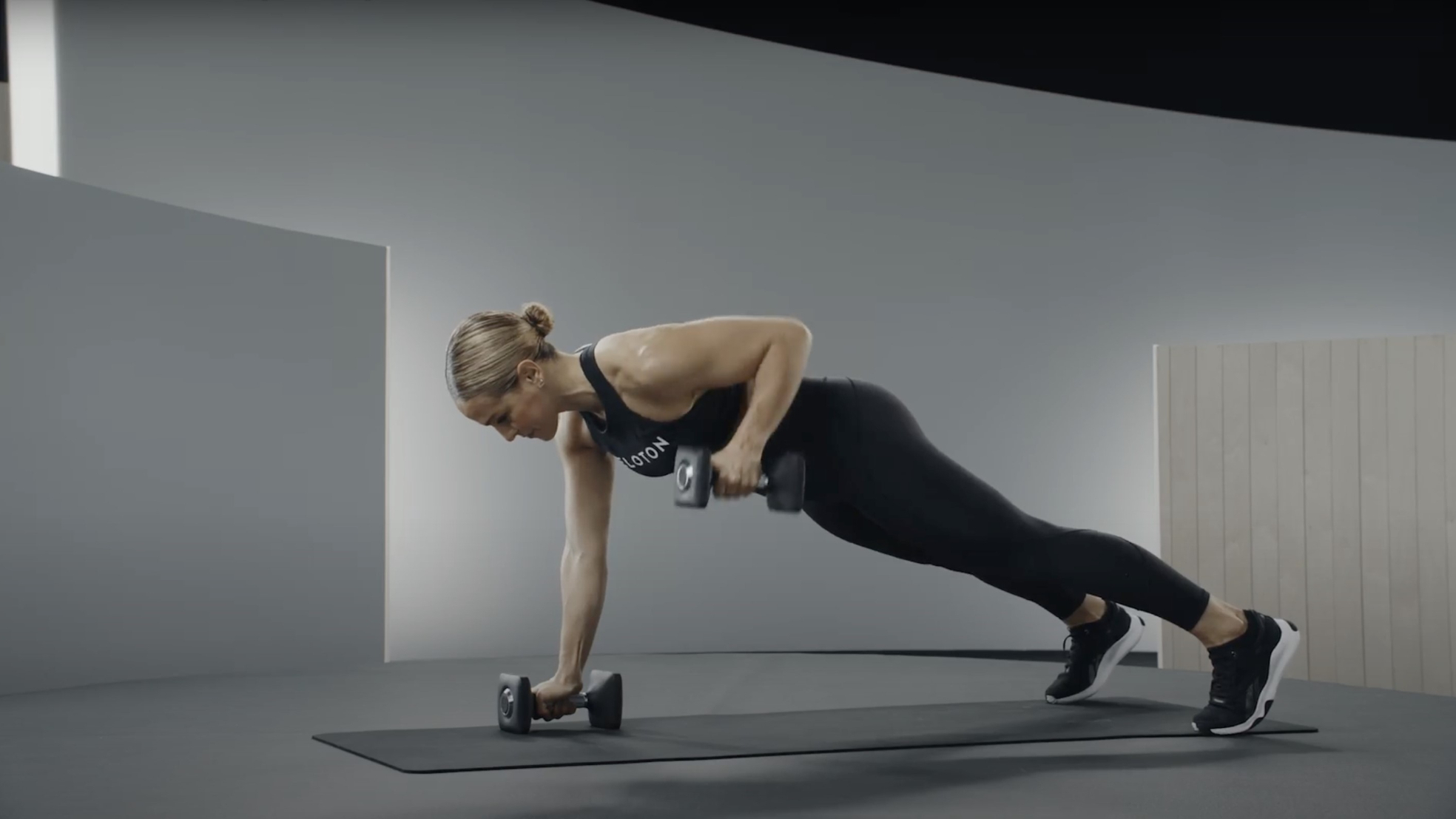Build strength and endurance with a four-move dumbbell workout from Peloton trainer Jermaine Johnson
This 25-minute routine is designed to help you build a strong, functional body


People often assume you need to set aside an hour to exercise, but the reality is many of us can see impressive results from much shorter workouts.
If you’re looking to optimize your time, try a full-body session like this routine from Peloton trainer Jermaine Johnson.
It works every major muscle group in your body with just four moves and you only need a couple of dumbbells to do it, so you can try it at home or in a busy gym.
How to do Peloton trainer Jermaine Johnson’s full-body dumbbell workout
- Chest press: 3x12-15
- Renegade row: 3x10 (on each arm)
- Dumbbell thrusters: 3x10-12
- Alternating reverse lunges: 3x12 (on each leg)
Complete the exercises above in straight sets. This means you should complete all of the prescribed sets of one exercise, with the allocated rest times between them, before moving on to the next exercise.
1. Chest press
Sets: 3 Reps: 12-15 Rest: 60 seconds
- Lie on your back with your arms extended upwards and a dumbbell in each hand, directly above your chest. Your palms should be facing each other in a neutral grip position. This will encourage you to adopt a more natural movement pattern, which is easier on the shoulders.
- Set your shoulder blades (think about bringing them together) then bend your elbows to slowly lower the dumbbells towards your chest. Avoid flaring your elbows as you do this, instead keeping them tucked quite close to your sides.
- When your elbows are just above the floor, push the dumbbells back to the start position.
2. Renegade row
Sets: 3 Reps: 10 (on each arm) Rest: 60 seconds
- Place the two dumbbells on the ground about shoulder-width apart with their handles running parallel to one another.
- Grip the handles then get into a plank position, with your weight spread between your hands and toes, and your body forming a straight line from the back of your head to your heels.
- Maintaining your balance, row the right dumbbell towards your ribcage, thinking about driving your elbow upwards.
- Lower it back to the starting position, then repeat on the other side.
3. Dumbbell thruster
Sets: 3 Reps: 10-12 Rest: 60 seconds
Start your week with achievable workout ideas, health tips and wellbeing advice in your inbox.
- Stand with your feet about hip-width apart and your toes pointed outwards slightly, holding a dumbbell in each hand at your shoulders.
- Push your hips back and bend your knees to squat down until your thighs pass beyond parallel with the ground. Keep your chest up and your back straight as you do this.
- Drive through your feet to stand up forcefully, and as you do this push the dumbbells overhead so your legs and arms are fully extended upwards.
- Lower the dumbbells to your shoulders. While you’re doing this, begin squatting down to start the next repetition. The repetitions should string together in one fluid motion.
4. Alternating reverse lunge
Sets: 3 Reps: 12 (on each leg) Rest: 60 seconds
- Stand with your feet roughly hip-width apart, with your arms by your sides and a dumbbell in each hand. If you're new to this exercise, you can also try it without weights.
- Step backward with your right foot and lower your right knee until it’s almost touching the ground. In this bottom position, both knees should form a rough right angle.
- Drive through your front left foot to return to the starting position, maintaining a straight back throughout the movement, then repeat on the other side.
Benefits of Peloton trainer Jermaine Johnson’s full-body dumbbell workout
We’ve already established that full-body routines are an efficient way to work out (this particular example should take about 25 minutes). But that’s not this session’s only benefit.
"The varied moves challenge both strength and endurance, promoting overall fitness," says Johnson. "The workout also mimics everyday movements, enhancing practical strength and coordination that you apply to life."
For example, a dumbbell thruster follows a similar pattern to taking a heavy bag off the top shelf at a supermarket, while a lunge echoes tying your lace or picking something up off the floor.
Strengthening your body in these positions will bolster your muscles, bones and joints, making everyday tasks feel easier and leaving you less susceptible to injury.
Peloton trainer Jemraine Johnson’s top tips for this workout
Warm-Up: "Always warm up before starting a workout. Perform dynamic stretches to prepare muscles for the workout."
Form Matters: "Prioritize proper form over heavy weights to prevent injuries and maximize effectiveness."
Progress Gradually: "Use weights that challenge you but also allow you to maintain proper form, and remember to gradually increase intensity as you become more comfortable."
This is known as the progressive overload principle, and it can help you build strength and muscle. If you need help choosing a set of dumbbells, take a look at our feature on “What dumbbell weights should I use?”.
Listen to Your Body.: “If something doesn’t feel right, adjust or seek guidance.”

Harry Bullmore is a Fitness Writer for Fit&Well and its sister site Coach, covering accessible home workouts, strength training session, and yoga routines. He joined the team from Hearst, where he reviewed products for Men's Health, Women's Health, and Runner's World. He is passionate about the physical and mental benefits of exercise, and splits his time between weightlifting, CrossFit, and gymnastics, which he does to build strength, boost his wellbeing, and have fun.
Harry is a NCTJ-qualified journalist, and has written for Vice, Learning Disability Today, and The Argus, where he was a crime, politics, and sports reporter for several UK regional and national newspapers.